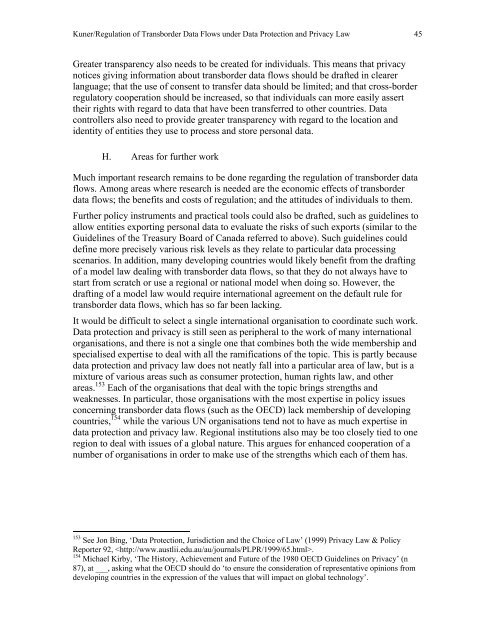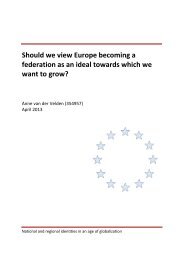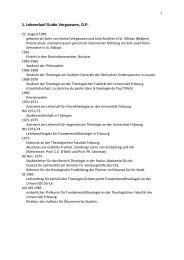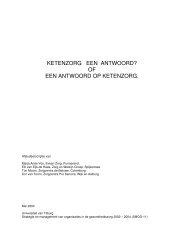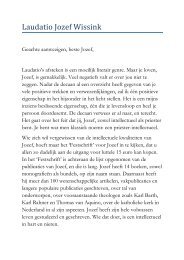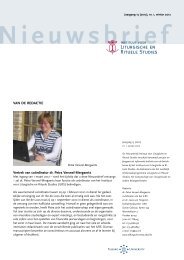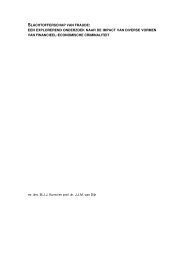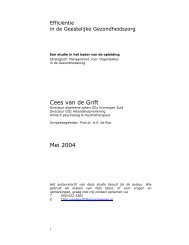Regulation of Transborder Data Flows under ... - Tilburg University
Regulation of Transborder Data Flows under ... - Tilburg University
Regulation of Transborder Data Flows under ... - Tilburg University
Create successful ePaper yourself
Turn your PDF publications into a flip-book with our unique Google optimized e-Paper software.
Kuner/<strong>Regulation</strong> <strong>of</strong> <strong>Transborder</strong> <strong>Data</strong> <strong>Flows</strong> <strong>under</strong> <strong>Data</strong> Protection and Privacy Law 45<br />
Greater transparency also needs to be created for individuals. This means that privacy<br />
notices giving information about transborder data flows should be drafted in clearer<br />
language; that the use <strong>of</strong> consent to transfer data should be limited; and that cross-border<br />
regulatory cooperation should be increased, so that individuals can more easily assert<br />
their rights with regard to data that have been transferred to other countries. <strong>Data</strong><br />
controllers also need to provide greater transparency with regard to the location and<br />
identity <strong>of</strong> entities they use to process and store personal data.<br />
H. Areas for further work<br />
Much important research remains to be done regarding the regulation <strong>of</strong> transborder data<br />
flows. Among areas where research is needed are the economic effects <strong>of</strong> transborder<br />
data flows; the benefits and costs <strong>of</strong> regulation; and the attitudes <strong>of</strong> individuals to them.<br />
Further policy instruments and practical tools could also be drafted, such as guidelines to<br />
allow entities exporting personal data to evaluate the risks <strong>of</strong> such exports (similar to the<br />
Guidelines <strong>of</strong> the Treasury Board <strong>of</strong> Canada referred to above). Such guidelines could<br />
define more precisely various risk levels as they relate to particular data processing<br />
scenarios. In addition, many developing countries would likely benefit from the drafting<br />
<strong>of</strong> a model law dealing with transborder data flows, so that they do not always have to<br />
start from scratch or use a regional or national model when doing so. However, the<br />
drafting <strong>of</strong> a model law would require international agreement on the default rule for<br />
transborder data flows, which has so far been lacking.<br />
It would be difficult to select a single international organisation to coordinate such work.<br />
<strong>Data</strong> protection and privacy is still seen as peripheral to the work <strong>of</strong> many international<br />
organisations, and there is not a single one that combines both the wide membership and<br />
specialised expertise to deal with all the ramifications <strong>of</strong> the topic. This is partly because<br />
data protection and privacy law does not neatly fall into a particular area <strong>of</strong> law, but is a<br />
mixture <strong>of</strong> various areas such as consumer protection, human rights law, and other<br />
areas. 153 Each <strong>of</strong> the organisations that deal with the topic brings strengths and<br />
weaknesses. In particular, those organisations with the most expertise in policy issues<br />
concerning transborder data flows (such as the OECD) lack membership <strong>of</strong> developing<br />
countries, 154 while the various UN organisations tend not to have as much expertise in<br />
data protection and privacy law. Regional institutions also may be too closely tied to one<br />
region to deal with issues <strong>of</strong> a global nature. This argues for enhanced cooperation <strong>of</strong> a<br />
number <strong>of</strong> organisations in order to make use <strong>of</strong> the strengths which each <strong>of</strong> them has.<br />
153 See Jon Bing, ‘<strong>Data</strong> Protection, Jurisdiction and the Choice <strong>of</strong> Law’ (1999) Privacy Law & Policy<br />
Reporter 92, .<br />
154 Michael Kirby, ‘The History, Achievement and Future <strong>of</strong> the 1980 OECD Guidelines on Privacy’ (n<br />
87), at ___, asking what the OECD should do ‘to ensure the consideration <strong>of</strong> representative opinions from<br />
developing countries in the expression <strong>of</strong> the values that will impact on global technology’.


